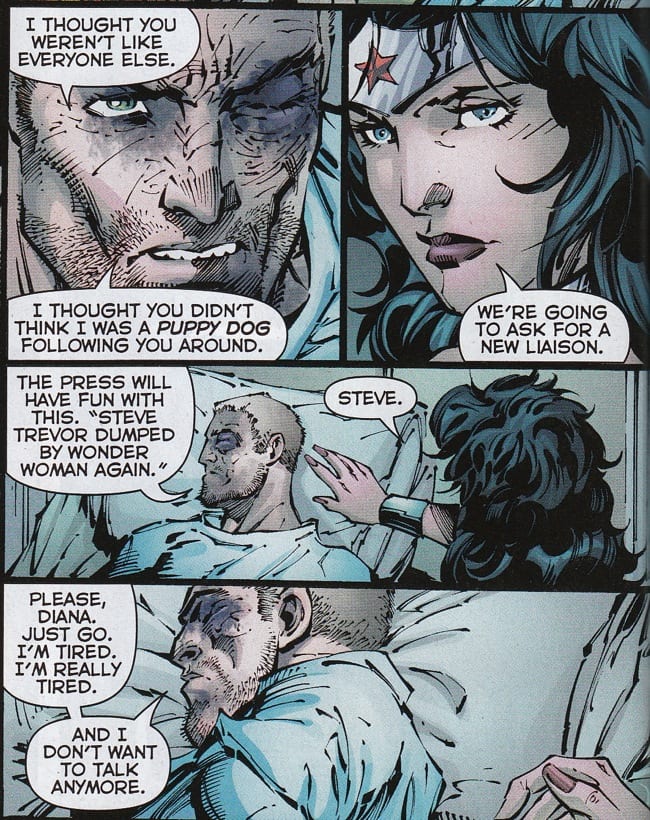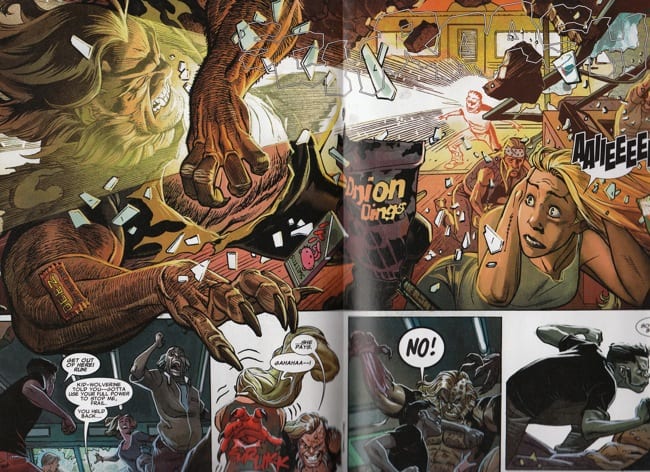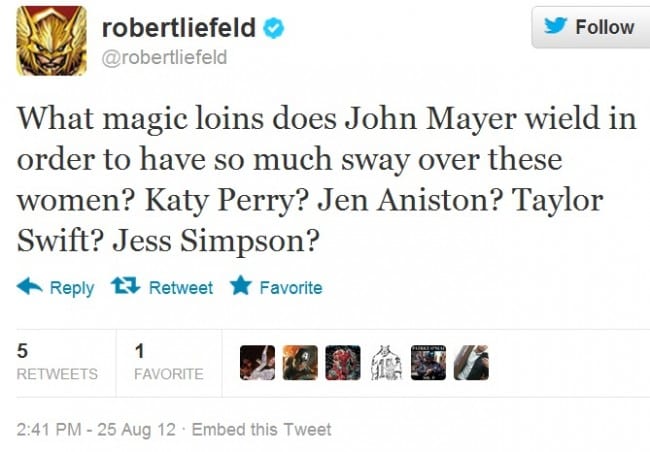Aaaaand we're back! I went on a legitimate vacation last week, meaning that I didn't look at websites, read comic books, or criticize anybody's taste in anything. (Well, I did screw up on that last one a bit when my mother brought up the still-touchy subject of Homeland, a television show she had introduced me to over last Christmas. See, I think the show is a compelling thriller despite its absurd plot and leaden lead performer, whereas my mother adores Damian Lewis and everything else about Homeland--well, except for all the free jazz they use to accent Claire Danes manic episodes, but nobody likes free jazz, honestly--and the conversation took a difficult turn when she called me a "snob," after which I angrily reminded her once again that I am someone who spends the majority of his time talking about Batman, and besides all that it is very possible to enjoy the violent bits of Band of Brothers while still finding Damian Lewis to be a completely tiresome actor, because Donnie Wahlberg does a good job and that guy from Office Space has a pretty neat character arc, and also that it's all easy-to-swallow war movie cliches in the first place, and we probably would have kept going and started saying things we really didn't mean if that hadn't been the exact moment when we realized that we were only half paying attention because someone had tuned the television to a show called Tabatha's Salon Takeover, which is a very compelling speedball of shlock about an exceedingly cruel woman with what sounds like an Australian accent who comes to small American hair salons and gives what seems like very obvious advice like "clean these filthy towels more often" and "answer the phone when it rings" and "stop being physically disgusting while on the clock" in a manner that I found more compelling than an entire semester on French theater I once took—and I was living in France at the time. Other than that though, I stayed clean and dry from reviewing things, and while it was very rewarding on a personal level, it will make this week's column short and somewhat abrupt.)
So what did I learn? The obvious and most truthful answer is, of course, nothing: and yes, I doubt very much that any readers of these columns, either new or long term, while notice much of a difference. But things are different, friend. More to come!
Prophet #28
By Brandon Graham, Giannis Milonogiannis, Simon Roy, Joseph Bergin III, Charo Solis
Published by Image

Although Prophet's first three-issue arc remains the most compelling so far, this current one--an old badass puts the team back together tale--is proving itself a worthy contender for the title. It's a welcome shift, after a few issues that see-sawed between "incoherent" and "aimless." Solitary pursuits be damned: in a Brandon Graham script, there comes a point where it's just going to be more engaging for the characters talk to each other. (Of course, there's a case to be made that the coloring in this issue--a palette-shifting fiesta that has no contemporary American comparison--is reason for engagement alone, but why not save that argument for when we get an issue of Prophet that lacks either draftsmanship or a compelling narrative? We don't need that bullet quite yet.)
Justice League #12
By Jim Lee, Geoff Johns, Ivan Reis, David Finch, Scott Williams, Sandra Hope, Jonathan Glapion, Mark Irwin, Matt Banning, Rob Hunter, Joe Weems, Alex Garner, Trevor Scott, Alex Sinclair, Gabe Eltaeb, Tony Avina, Sonia Oback, Pete Pantazis
Published by DC Comics

This comic has apparently established some presence amongst the Great Unwashed, proving once again that getting an article in USA Today--and thereby getting your story out in front of every prepubescent soccer team with an overnight game in Holiday Inn country--is the only publicity route that matters, even more so now that Geoff Boucher won't be copying and pasting DC's press releases at the LA Times. It's a comic that's best left uncritically explained: first up, because its a comic that is hopefully going to serve as an introduction to the Justice League for a bunch of non-comics readers, the story title can't have any part 1/part 2/part 3 kind of bullshit in it, even though the issue actually is the conclusion of a story that's been going on for a little while now. And since they're cutting that out, a recap of the previous story is necessary, hence the first four pages of this comic are exactly that, using the conceit of a news program discussing the League's previous actions (which, following the timeline presented in the comic, are "previous" to the tune of a few minutes), and then returning right to the moment where the bad guy is explaining his plot, which began with him kidnapping and torturing Steve Trevor, Wonder Woman's ex-boyfriend.

The bad guy's plan boils down to his biography: he's a man who lost his entire family (and is himself dying) from exposure to Darkseid, the bad guy who had fucked up the League in a previous story. David Graves believes that the League's failure to protect him stems from the lack of congruence amongst each member's backstory, specifically, that Wonder Woman hasn't lost anyone she loves. (He does not explain what led him to choose Skeletor as costume inspiration, a missed opportunity for all of us fans of Vision Boards.)

Graves's purported goal with this act is to eventually resurrect everyone who has ever died, but thanks to Steve Trevor's military training (and the confusing lack of effective jailing skills on the part of villains who are presented as being somewhat omnipotent), Graves's plan fails, the good guys win by pouring on the violence against foes that only Batman seems to comprehend, and then the comic cuts back to the part leading up to the cover. First things first:

Wonder Woman has to humiliate Steve Trevor, again, with a double-break-up. Unless you count the entirety of the Western news media standing outside your house asking what it's like to get dumped by Wonder Woman, or being kidnapped and tortured for days so that Wonder Woman will feel bad and be a better Justice League member as a break-up, which would mean that Wonder Woman--who has already dumped this guy once--is actually dumping Steve Trevor a fourth time when she goes to his room in the ICU and says, "I don't even want you in my life as a friend, Army guy."

And then she hooks up with Superman after he asks her if she ever feels lonely. Because of love, apparently? Maybe commerce. Either one fits!
Avenging Spider-Man #11
By Zeb Wells, Steve Dillon, Frank Martin
Published by Marvel Comics

In this issue of Avenging Spider-Man, the character of Spider-Man meets his Aunt May at the gravesite of Ben Parker, his uncle and her dead husband, and there is no avenging to be had, none whatsoever. Instead, the two of them exchange memories--not about how wonderful it was to have had Ben in their lives, but instead to recall how much the two of them grieved over his death. In fact, the comic--made almost completely out of the flashbacks of two people standing in a graveyard--never depicts Uncle Ben, choosing instead to depict two people flashing back to the times they cried after Uncle Ben died. (There is also a part where Aunt May responds to Peter's idle "how's it going with Jay?"—Jay being her new beau—by talking about her rekindled sex drive and her almost childish concern that Ben might be watching her have sex from beyond the grave, which would apparently be very easy, as she is having a lot of it. She then playfully condemns Peter for being "so sensitive" for the crime of not wanting to hear what is (essentially) his elderly mother describe her frequency of intercourse, while literally standing on top of what is (essentially) his father's grave. But otherwise, the rest of this comic is people having flashbacks to times when they cried. Prediction: this comic book is going to win an Eisner for best single issue.
Miracleman #2-7, 9-11
By Alan Moore, Garry Leach, Alan Davis, Chuck Beckum, Rick Veitch, John Ridgway, John Totleben
Published by Eclipse Comics, 1985-87

He used to just be a guy who wrote comics, then he became the guy who wrote "the" comic, then Gary Groth got him to admit he'd be down like a clown to sell porno to children, and now he's a cautionary tale in the same camp as Stan Lee: someone the majority of fans would prefer dead, because that way they won't embarrass their past by having a future. Fun times! These comics all came out before that, and they're just that: comic books, overly serious at times but mostly just steeped in an extended exploration in taking something super goofy and making parts of it super serious. A guy explains his powers--which come from a wizard and a magic word--and somebody stops him and points out how completely ridiculous it all sounds, but when his powers actual get an explanation, along with his costume and the reasoning behind it, that explanation is just as ridiculous as the lie was, as is the bad guy--a mad scientist--who delivers it but at that point, Moore delivers it without the sarcastic jibes he'd used previously. The art starts changing, whipping between the hyper detail and intricacy of Garry Leach to the get-it-done pages of Chuck Beckum, and there's a black guy with weird teeth who plays sacrificial magic negro and never gets to do anything cool with his teeth, you get the Veitch Vagina issue, a warts n' all depiction of childbirth that inadvertently shines a light on how empty and unconvincing the character of Miracleman's wife is. It looks like a duck, but the quack never lands. However, there is some famous hardcore violence to come, if that is your thing.
Uncanny X-Force #30
By Rick Remender, Dave Williams, Dean White
Published by Marvel Comics

Is there any better reminder than a Jerome Opena cover of what this series lost when Marvel threw all its support behind "shipping a title 2-3 times a month, whatever it takes" as a business model? This issue isn't even drawn badly, and yet Opena and White's work does more to humanize the youthful Apocalypse than the entirety of the actual comic. Remender's story has circled that character since the beginning, the first arc tracing Wolverine's black ops team as they hunted the boy, only to realize that their petty debates over the ethics of preemptive assassination ill-prepared them for when the killing moment actually arrived. The murder of the child spurned further plots (one of which involved resurrecting the kid and raising him in a fake version of Smallville, complete with Kent stand-ins) and Remender was able to use a love triangle to offset the Serious X-Men Story trap, but eventually, we'd end up where we are now--with Apocalypse at the precipice that the beginning of this series operated in fear of, and the question of what happens next can't be put off any longer. Also, there's a Deez Nuts joke on Sabretooth's arm.
OBVIOUSLY, THERE WAS A LOTTA NEWS TO BE DEALT WITH. HERE'S ABHAY KHOSLA WITH THE JUICY BITS.
"If you read the interviews with mainstream comics creators in Wizard or on the Internet, or the voluminous blogs, rants and screeds of mainstream creators — usually easily found on their very own websites, each devoted to the creator’s singular genius — and the response of their obsequious fans, you’d conclude that mainstream comics creators are bloviated megalomaniacs who consider themselves the center of the pop-cult universe and think their fans are hanging on their every self-important opinion." -- Gary Groth, 2006.
So, what happened then is that everyone working in mainstream comics started quitting their jobs, right? Ed Brubaker quit-- people are treating why he quit like it's a big mystery. If I know my Ed Brubaker mysteries, that mystery will start out promising and then devolve into an unconvincing action scene at the end. Grant Morrison has either quit mainstream DC, or is writing Wonder Woman comics-- so, even the story of him quitting is too convoluted and has too many plotlines for me to follow it. But I'm looking forward to your annotations. Judd Winnick-- quit; behind the scenes people-- quit.
The highest profile quitting has been a comic artist named Rob Liefeld, who was making comics about The Hawkman and so forth for DC. It turns out Rob Liefeld has a Twitter account, and here's his account of quitting his job as a freelance comic creator: "so remember that time Don Draper walked out when Duck Phillips thought he had him pinned down? Yeah, that was me today. #imdon :)"
But apparently in the season of Mad Men Liefeld watched, Don Draper quit his job, then got onto Twitter, and tweeted about Duck Phillips's "little pecker." (Which still sounds better than that episode where Don kept a diary.)
The pecker-commentary here was directed at some Associate Editor-- that part I could at least comprehend. Mostly, Liefeld's tweets were confusing because they involved Daemonites and Helspont and other shit-boring Jim Lee characters I will never care about, even when featured in a series of angry tweets from disgruntled ex-employees. Daniel Day-Lewis could scream from atop a river of hell-fire about Daemonites directly into the lady-buttocks of an angelic choir, and it'd still be boring, boring, DC Comics boring. Liefeld seemed to be trying, in his ESL way, to describe DC as a chaotically organized, editor-over-talent company with lots of territorial infighting, no clear sense of direction, and poor story ideas-- or as DC comics fan call it, "The only DC Comics I have ever known in the entirety of my life." The most confounding bit was where Liefeld quoted a DC editor saying, "Early on we had a lot of indie talent that weren’t used to re-writes and changes ... made it hard." DC thinks the problem was it hired too much indie talent? Also: DC thinks it hired any indie talent at any point? Say what you will, but Sue Coe's issues of Psyba-Rats were underrated.
People really seemed to mind what Liefeld was saying and felt an urgent desperation to share that fact with anyone they could. (I guess everyone in comics is still supposed to pretend to be Bullpen pals, the way strippers are all supposed to be paying for computer classes...?) Tom Brevoort volunteered that he would blackball Liefeld from working at Marvel.
When Liefeld objected, and insulted Brevoort, Tom Brevoort lashed back, tweeting "feel free to say any of this to my face, you feckless bully." Presumably because if he were to say it to Brevoort's face, it would all be violence, certain violence, and Brevoort would relish nothing more than to show Liefeld that he was the harder man, that he is in his own way much like Ben Kingsley's character from Sexy Beast. More Beast than Sexy, if anything, a beast of whirling fists, and biting teeth, rending flesh, taping together buttocks like Emilio Estevez's character from The Breakfast Club but without any of Estevez's regret or remorse, without those weak human emotions holding him back. No, for he is revolted by human weakness-- Oh, it nauseates him, what other men would refer to as pity or compassion, their ridiculous compromises! All to avoid, what-- conflict? Ha! He is a man for whom conflict is what makes a man get out of bed in the morning, confrontation is his breakfast, struggle his true after-breakfast pre-lunch snack; but lunch itself is spent gluing broken glass onto his hands to better make the world bleed, for only the blood can sate him. The blood of the innocent? Grow up! Who can say they're truly innocent in this world of compromises? A baby born into this world is born guilty, born deserving a lifetime of punishment, punishment that is a dish Tom Brevoort serves cold, most likely for dinner, with a sensible dessert of bone-crunching agony.

Tremble, all ye motherfuckers, tremble.
Scott Snyder also decided to privately volunteer to Liefeld, for reasons I can not begin to decipher, that the Batman comic he co-creates at the same time a series of successful Batman movies are coming out are successful because of Scott Snyder & co.: "I can assure you Batman doesn't sell the way it does because it's Batman. It sells that way because of me and Greg [Capullo]."
Scott Snyder finally cracked why people like Batman, and it turns out the answer is Scott Snyder. And apparently, Scott Snyder just goes around privately letting other people who work in comics know that someday they can spread his legend, so that our children and our children's children will know.
But eventually, the heat of these things faded. Things mostly seem to have calmed down now, and gotten back to normal on Twitter.
Normal on twitter...









